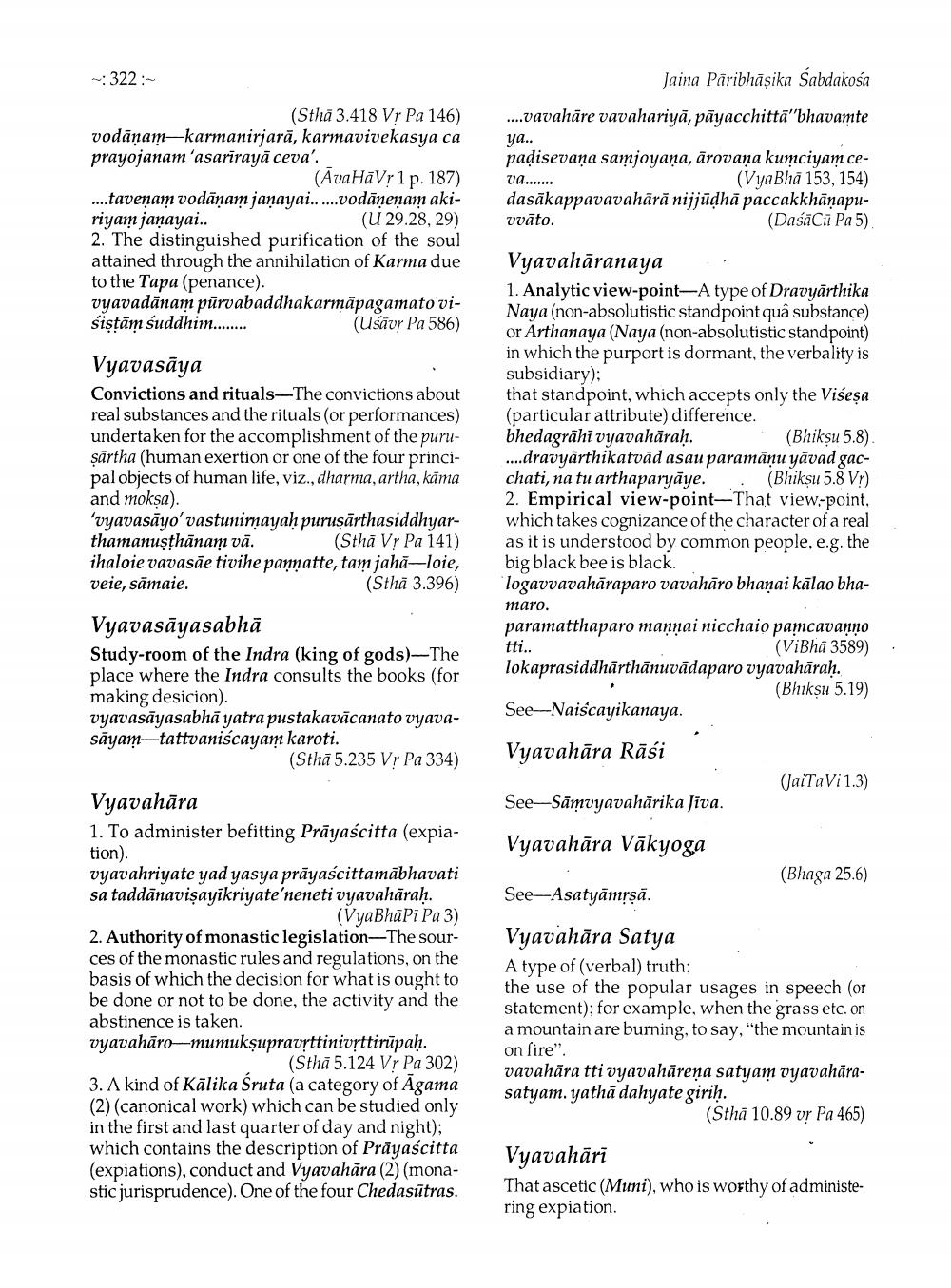________________
-322:
Jaina Pāribhāşika Sabdakośa
(Sthā 3.418 Vr Pa 146) vodāņam-karmanirjarā, karmavivekasya ca prayojanam'asarīrayā ceva'.
(ĀvaHāVr1 p. 187) ....tavenam vodāņam jaņayai......vodāņenam akiriyam janayai..
(u 29.28, 29) 2. The distinguished purification of the soul attained through the annihilation of Karma due to the Tapa (penance). vyavadānam pūrvabaddhakarmāpagamato visistām suddhim........
(Usavr Pa 586)
....vavahāre vavahariyā, pāyacchitta'bhavamte ya.. padisevaņa samjoyana, ārovana kumciyam ceva.......
(VyaBhā 153, 154) dasākappavavahārā nijjūdhā paccakkhānapuvvāto.
(Dasācu Pa5)
Vyavasāya Convictions and rituals—The convictions about real substances and the rituals (or performances) undertaken for the accomplishment of the purusärtha (human exertion or one of the four principal objects of human life, viz., dharma, artha, kama and moksa). "vyavasāyo'vastunimayaḥ puruşārthasiddhyarthamanusthānam vā. (Sthā Vr Pa 141) ihaloie vavasāe tivihe pannafte, tam jahā-loie, veie, sāmaie.
(Sthā 3.396)
Vyavahāranaya 1. Analytic view-point-A type of Dravyārthika Naya (non-absolutistic standpoint quâ substance) or Arthanaya (Naya (non-absolutistic standpoint) in which the purport is dormant, the verbality is subsidiary); that standpoint, which accepts only the Visesa (particular attribute) difference. bhedagrāhi vyavahāraḥ,
(Bhiksu 5.8). ....dravyārthikatvād asau paramāņu yāvad gacchati, na tu arthaparyāye. . (Bhiksu 5.8 Vr) 2. Empirical view-point-That view-point, which takes cognizance of the character of a real as it is understood by common people, e.g. the big black bee is black. logavvavahāraparo vavahāro bhanai kālao bhamaro. paramatthaparo mannai nicchaio pamcavanno tti..
(Vibha 3589) lokaprasiddhārthānuvādaparo vyavahāraḥ.
(Bhiksu 5.19) See-Naiscayikanaya.
Vyavasāyasabhā Study-room of the Indra (king of gods)--The place where the Indra consults the books (for making desicion). vyavasāyasabhā yatra pustakavācanato vyavasāyam-tattvaniscayam karoti.
(Sthā 5.235 Vr Pa 334)
Vyavahāra Rāśi
(JaiTaVi 1.3)
See-Sāmvyavahārika Jiva.
Vyavahāra Vākyoga
(Bhaga 25.6)
See-Asatyāmrşā.
Vyavahāra 1. To administer befitting Prāyascitta (expiation). vyavahriyate yad yasya prāyascittamābhavati sa taddānavişayikriyate'neneti vyavahārah.
(VyaBhāpi Pa 3) 2. Authority of monastic legislation-The sources of the monastic rules and regulations, on the basis of which the decision for what is ought to be done or not to be done, the activity and the abstinence is taken. vyavahāro-mumukṣupravrttinivettirūpah.
(Sthā 5.124 Vr Pa 302) 3. A kind of Kālika Śruta (a category of Āgama (2) (canonical work) which can be studied only in the first and last quarter of day and night); which contains the description of Prāyascitta (expiations), conduct and Vyavahāra (2) (monastic jurisprudence). One of the four Chedasütras.
Vyavahāra Satya A type of (verbal) truth; the use of the popular usages in speech (or statement); for example, when the grass etc. on a mountain are burning, to say, "the mountain is on fire". vavahāra tti vyavahāreņa satyam vyavahārasatyam. yathā dahyate girih.
(Sthā 10.89 vr Pa 465)
Vyavahāri That ascetic (Muni), who is worthy of administering expiation




